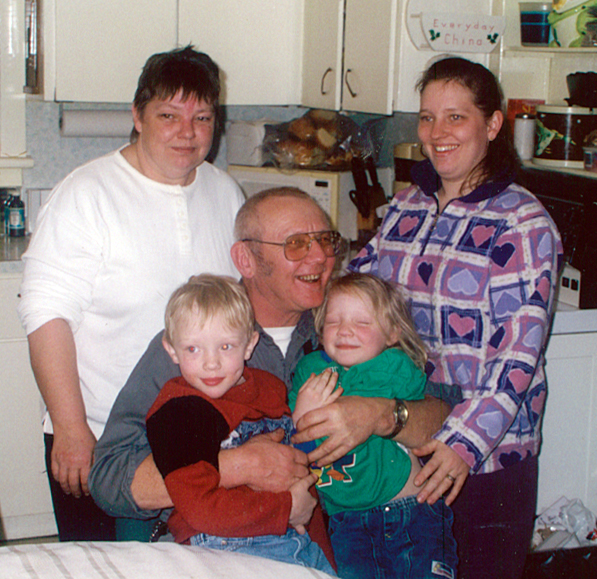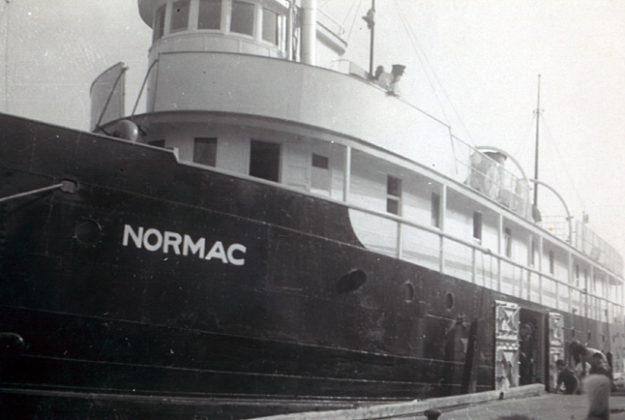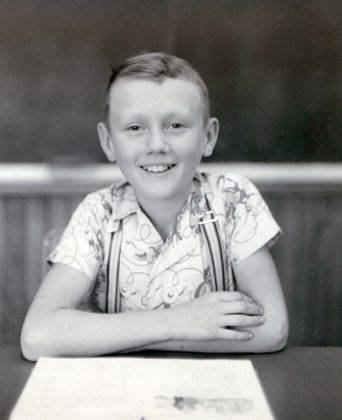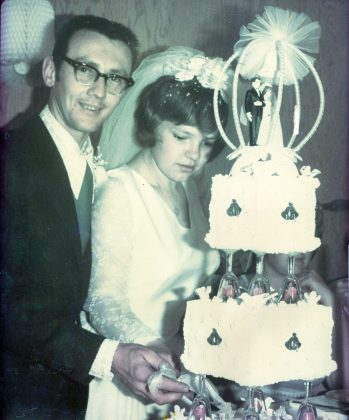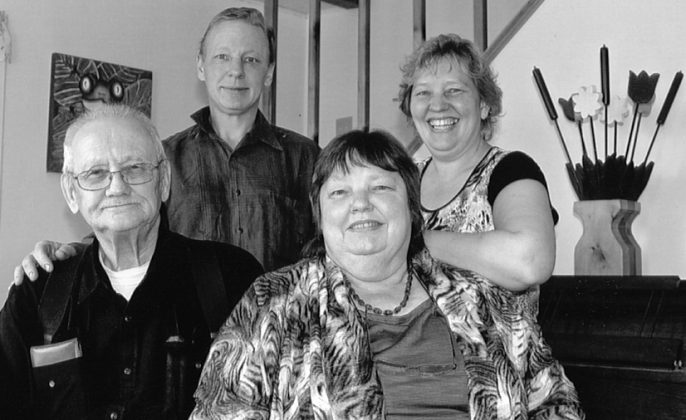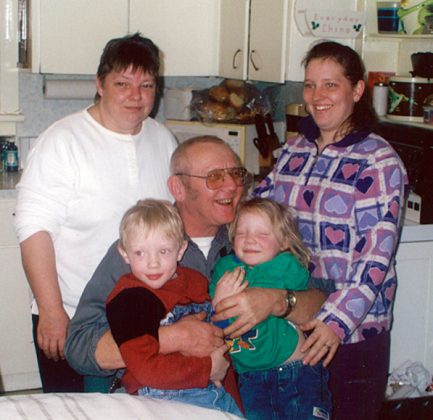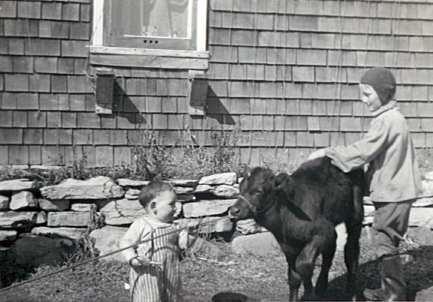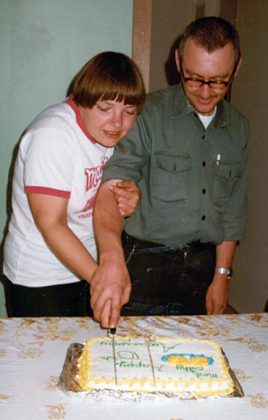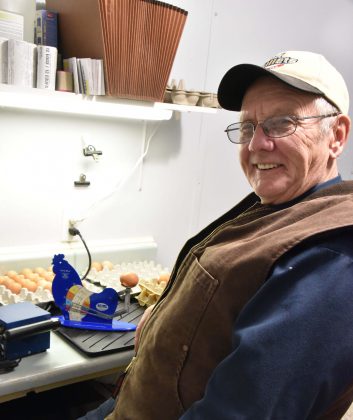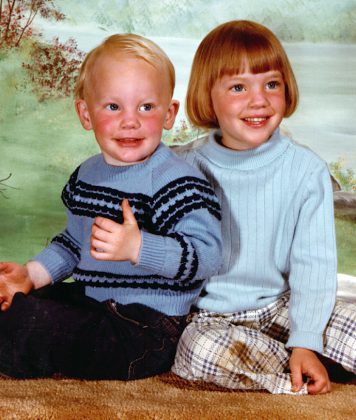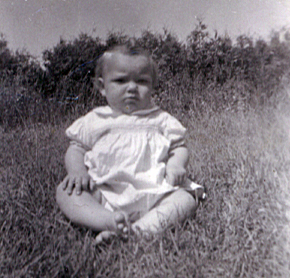Morley “Mort” Runnalls is a man of many talents. He has acquired skills in numerous jobs that have attracted him over the years, ranging from farm work to navigation. He ran a large combine, delivered milk, cut wood, was watchman and wheelsman on the Norgoma, Norisle and the Normac, worked at a gold mine, Manitoulin Transport, Hydro, McQuarrie Motors, and graduated to driving a school bus, raises chickens, grades and distributes eggs to local stores over much of the Island. Cathie has led a more peaceful life compared to Morley. She cleaned the municipal offices in Gore Bay and, after 1981, was employed with Manitoulin Transport where she eventually became the Interline Department Supervisor dealing with 1,200 bills a day.
Morley’s maternal side of the family came from the Owen Sound area. Great-grandfather John B. Baker and his wife Susan (Rows) lived there. Their son, Grandfather Joe Baker, married Gloria Sizer, a school teacher, new to the area. Joe’s dad had borrowed money to build a barn but then fell on hard times and was not able to pay off the mortgage. Joe went to Chicago, got a job at a steel factory and earned enough to get back the farm. “It didn’t take a lot of money to build a barn back then as the labour was provided by all the other farmers in the area, but horseshoe (square) nails and lumber cost money.”
“Dad’s family hailed from the Belleville area. Grandparents were Oliver and Katie (Jennings) Runnalls, originally from England, who moved to the USA and finally to Canada after the American War of Independence in 1787. Dad, Nelson, bought a farm on Barrie Island near the church. Later he traded his farm for one in Mills Township with our mother Verna’s uncle. The Mills farm was larger, but it had a mortgage on it. At one point, dad had trouble paying the mortgage, but it seemed that neither the bank nor the former owner wanted it, so he kept it and eventually it was paid off.”
Cathie’s mum Doris (Noland) comes from Irish stock and her dad Raymond Middaugh is of Pennsylvania Dutch heritage. Doris’ parents George and Nellie (Witty) Noland were farmers. Cathie’s grandparents on her dad’s side were Charlie and Ruby (Pearson) Middaugh. Charlie was a carpenter. Both Cathie and Mort were raised in Mills Township on either side of the beautiful local graveyard on the hill.
“On a humorous note, there is a story that a distant ancestor of mine cleaned the horse stable for the Queen of England,” Morley explains, grinning, “whereas a distant ancestor of Cathie’s stole a horse from the Queen, so there is a tentative connection in history. Also, George’s mum on Cathie’s side was Grandfather Baker’s first cousin on my side.”
Mort was born on January 9, 1945 to Nelson and Verna Runnalls. “My first memory at about three was reaching up with my pointing finger to just barely reach and turn on the light switch. I could turn it on but wasn’t tall enough to turn it off again. That was alright it seems, because the hydro was new and wouldn’t be turned on (connected to their home) for another year.”
Another memory was being driven over the Espanola hills. “My sister Mona was headed for Normal School in North Bay and dad was driving through the area just south of Espanola in our 1937 Ford. I couldn’t see out for the dust and there was lots of dirt flying around inside the car. Just before we got to the town, I got sick to my stomach. Dad had to stop the car and open my door, so I could get my head out in time.”
“We always had a dog, usually a ‘Heinz 57’. When I was small, the dog would be harnessed to pull me in the wagon.” Favourite television shows back then were ‘Gunsmoke’ and the ‘Beverly Hillbillies.’
School was not Mort’s favourite pastime. “My first day, I was ‘bawling’ and had to be dragged to classes. I just wanted to stay at home on the farm, even to milk cows. It was a two and a half mile walk each way to the Poplar corner for the school bus. History and math were the two subjects most tolerated, but it was all a waste of time in my eyes.”
“I recall one boy in Grade 1 used to build icy snowballs in his mum’s freezer. He would go home at lunch and bring them back, then hurl them at us. Once, he got me behind the ear. Three of us taught him a lesson after that and all would have been fine except his mother came to school to complain and all three of us got the strap.”
“Teachers Barbara Orr and Fern Patterson were okay. They never gave me the strap.” Morley stayed in school until he got to Grade 12. “At that point, I felt I had enough school. I didn’t get my diploma.”
Cathie Jean was born on September 7, 1955 to Doris (Noland) and Raymond Middaugh. She was named after Gene Autry with the ‘Gene’ feminized. She recalls her first day of school when the teacher asked her what her name was. “I told him ‘Cathie Meddamouse’ and everybody laughed. I was a little startled because that is what everybody had called me up to that point. I was very shy too.” Spelling became her favourite subject.
“I remember one family outing to Santa’s Village in Bracebridge. I saw a lot that I had never seen before, like elves, plastic balls you could jump into, and Santa himself. I had never seen a big riverboat like the one we went on, either. I also recall our pet pig. He would squeal and come upstairs and nibble on my ears in the morning. That sure got me up in a hurry.”
Sadly, her other strong memory was her dad’s car accident when Cathie was seven-years-old. “We were driven to grandma’s house in the middle of the night so mum could be with dad. When I woke in the morning I could hear my grandmother say, ‘and his glasses weren’t broken.’ It turns out that dad’s car was hit by another car and he sustained crushed vertebrae, broken ribs and multiple other injuries. He had to stay in the hospital for a long time and then he was bed-ridden for another year.”
“The community rallied around us and they all helped. A ‘wood bee’ was held to get us firewood. Groceries arrived at the door. Grandparents helped with a hydro bill. I was the oldest at seven and there were two younger siblings. Mum had to look after all of us and dad, as well as tend to the cattle, the garden and the camps she helped clean.”
Meanwhile Mort had left school and found four men to do a hydro job in West Bay. After that he headed for New Liskeard, joined his brother, learned to drive a combine and cut timber. “The cedar logs we cut were sold to Manitoulin Transport. We earned 25 cents for each peeled log and 15 cents for one that was not peeled. Removing the bark had to be done in winter so that the wood would not be discoloured. Much of the wood wound up in Niagara for the wine industry. I did that for two winters.”
His next job was with Wagg’s Creamery back on Manitoulin. “I bottled milk and delivered it for $150 a month, working six days a week, but this wasn’t enough for me to make the car payments, so I had to quit.” The next five months were spent in Sudbury working for Groom Callaghan Supply Company making $250 a month, delivering hardware and plumbing supplies, stocking shelves and driving trucks to various communities.
One morning, five months later, a friend of Mort’s, a First Mate on the EB Barber, a 500-foot ore carrier, called. It was October 4, 1965, and Mort was told that he had three hours to get to the boat in Little Current if he wanted the job that was available. Mort knew he would make ‘good money.’ He wasted no time, resigned from his Sudbury job and got himself to Little Current. The boat hauled iron ore pellets from Little Current to Windsor and Detroit and coal from Toledo back to Little Current.
“I remember my first morning. It was hard to get up at five in the morning when you aren’t used to it. It seems ignoring first call was not well advised. I woke to a long knife being stabbed through my mattress from the bottom and just missing my leg. It was the watchman’s job to get us up and moving and he succeeded amazingly well. I was never late again.” In no time, Mort had $1,900 in the bank, his car was paid off and he bought himself a new suit from Tip Top Tailors in Collingwood. “I had the suit sent home, so it would be there when I got off the ship. The suit was for an upcoming special occasion. Unfortunately, by the time I got to wear it, styles had changed, and cuffs were no longer ‘in’.”
The next job was deckhand for the ACR, The Algoma Central Railway, on a new boat, ‘The RA Jodry,’ a self-unloader, 630 ft. long. The company paid for the taxi ride to Collingwood for myself and another man, to the tune of $600, a lot of money at the time. In December of 1965 when he got off the boat, Mort cut wood for a month on Manitoulin.
The McIntyre gold mine attracted him next. Older brother Gerald had been employed there too. “I worked on the surface in the service sector and did not have to deal with the aluminum powder below ground. (This refers to the McIntyre Powder underground miners were told to inhale before their shift and which is now being investigated as a carcinogenic agent.) We all had to walk through a ‘Geiger counter’ to ensure nobody had taken any gold. Our clothes were only washed once a week and by the end of the week the pants could stand on their own in the corner. You had to beat them to get them on.”
In August of 1966 the Normac got Mort as a deckhand, soon to be wheelsman. He also worked on the Norisle and the Norgoma. Winters found him selling tobacco in a store, or timbering in the La Cloche area. In the fall of 1969, Mort took on a 78-mile milk route for the Co-Op Dairy in Sudbury. “I had 200 customers to keep happy, but they didn’t all need deliveries each day. This was a great job until I got married.”
“I met Cathie one day right after she finished babysitting at her uncle’s home. I had visited the Providence Bay Fair and then appeared at her uncle’s house to drive her home. I was taken with her and began to write her letters, but it seems they were illegible; she couldn’t read them. To add to the frustration, it seems I had attended school while Cathie’s mum was still there, and she had advised her daughter not to marry me for reasons of her own.”
However, the couple began to share more time together and decided to marry after all, on June 16, 1973. “It was about a week after I graduated from high school,” Cathie holds. “We married in the Mills church. It was a nice sunny day and the church was full. Supper was in the Mills Hall and then we partied for much of the night at Mum and Dad’s home. Later, it was off to the Lake Wosley Cabins, followed by breakfast back at my parents’ home. Mort had to work on the Monday.”
After the wedding, Cathie got work babysitting for a family. Mort left the dairy and worked for Manitoulin Transport from their Sudbury warehouse, delivering goods to many locations. In 1975 the couple moved back to the Island and Mort worked for a farmer. In 1985 The couple bought their own farm and a year later, the house they now live in. Mort found more permanent work at McQuarrie’s Motors. He continued to drive the school bus as he had since 1978. He became a good parts manager for McQuarrie’s and won the Superstars’ Cruise in 1984 for selling the second highest number of parts.
Cathie brought in extra money, cleaning homes and the municipal offices for the Town of Gore Bay. After 1981, she worked for Manitoulin Transport. “Those were the ‘ripping’ days, as I recall. We had to rip apart up to 1,200 pro-bills a day, so we could add them all up and balance them. We had to work until they all balanced.” Cathie stayed at Manitoulin Transport for 17 years until 1998. After that she became the janitor for the local school.
At home, their farm boasted the normal animals: ducks, geese, chicken, pigs including Rosie (the sow) and other animals from time to time. In 1992 the couple leased Obejewung Park on the south end of Lake Wosley. “We ran it for 10 years, renting trailer sites, cleaning central areas and manning a small fast food outlet. We sold our interest in the park in 2002 but we continue to farm and drive the school bus.”
“Once a wild turkey ran into me in Elizabeth Bay while I was driving the school bus,” Morley shares. “I radioed in to dispatch and told them, ‘a turkey just ran into me.’ Dispatch wanted to know the damage and what the other person looked like. I responded, ‘he looked like Tom’ which implied either ‘Tom turkey’ or Tom my boss who also had a beard. When dispatch finally figured it out, we both had a good laugh.”
Much to Cathie’s dismay, daughter Carmen and her husband and two children moved far away to China for a few years. The children went to school there, but Carmen came back in 2013 with one of her children, Cheyenne. Cash stayed in China with his father. Grandson Cash is taking international law at the Shanghai University and granddaughter Cheyenne is in Grade 12 at M’Chigeeng. Carmen’s family lives in Gore Bay.
Sadly, son Nelson was involved in a serious car accident when he was 17. His head injury required much hospital time and then rehab after that. Cathie started working half days so she could spend more time with him. “This was compelling evidence for how quickly life can change and, in turn, your perspective. You realize how important family is and you naturally become more compassionate. Nelson is doing much better now and working at various jobs, like roofing,” Cathie shares.
Mort tells us that he had a heart attack seven years ago and a stint was required. “Six years ago, it was prostate cancer but neither has slowed me down. I am busy driving the bus and grading eggs at our egg grading station here on the property. I deliver eggs to many of the towns around here, including Gore Bay, Mindemoya, Manitowaning, Spring Bay, Little Current, Kagawong, M’Chigeeng and Sandfield. The station is government-inspected, and the work is nearly full-time.” Mort also oversees the Mills cemetery. “I have been told I have to dig my own grave before I quit,” he adds, straight-faced.
Cathie enjoys her family the most and then tending to her garden. Much of the produce is canned. She also enjoys playing the piano. “I loved the fun weekends when they were growing up, the games we played together and even the messes that they made. Today, I like to call family members each day or at least a few times a week to make sure everyone is alright. We are a close family.”
Mort says he is not much good at any one thing, but we know he can do a lot of jobs well. He has a great sense of humour and his memory of the past is impressive. “I made up a CD of some old songs topped off with ‘Seven Spanish Angels,’ his theme song. I hear them played locally from time to time. I guess the old songs have some universal appeal.”
“I am proud of my family too,” he adds. “What do I fear the most? I wouldn’t want to relive a few of the things that happened in my life so far, but most of it has been very satisfying.” Cathie answers too: “I fear being alone, and something hurting my family.” The only regret Mort has is that he would have bought his own farm a little sooner. Cathie liked school and would have liked to go to university and taken business. “We both wanted to try white water rafting but now we are a little afraid to do that.”
“Who inspired me? Leonard Cohen, his outlook on life and his non-conforming nature,” Mort offers. Our recipe for happiness? Mort declares, “Fight and get it over with.” Cathie adds, “Go with the flow.” Any recommendations for our youth? “Society seems to be making the work ethic less valuable. Kids often have enough money, so they don’t have to work. Also, there are social nets like welfare that were not available in the distant past. Some folks abuse the infrastructure created to prevent abject poverty which can lead to welfare becoming generational.”
“Manitoulin is home to us. All our relatives are here and most of our friends.” Every Christmas, Mort dons his Santa suit and brings a lot of cheer to his family at the annual Christmas get-together. “We love to see the kids’ eyes light up.” Cathy confirms their love for family and the outdoors, Manitoulin’s raw nature. Mort adds, “That’s why we are here. There are few places where I go that people don’t call me by my name. The people here are special, and Manitoulin is safer than many other places. We could never live in a city. We are very happy here.”

